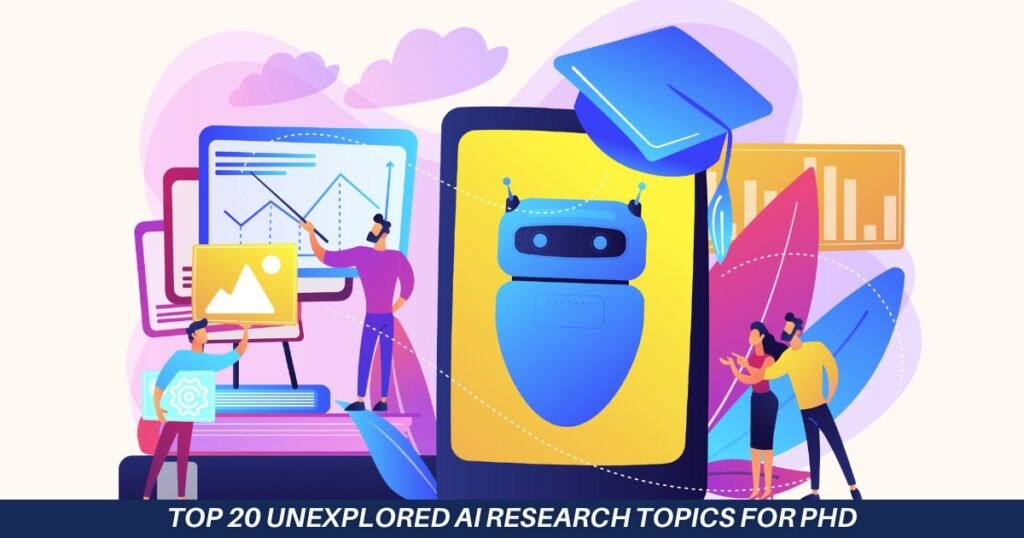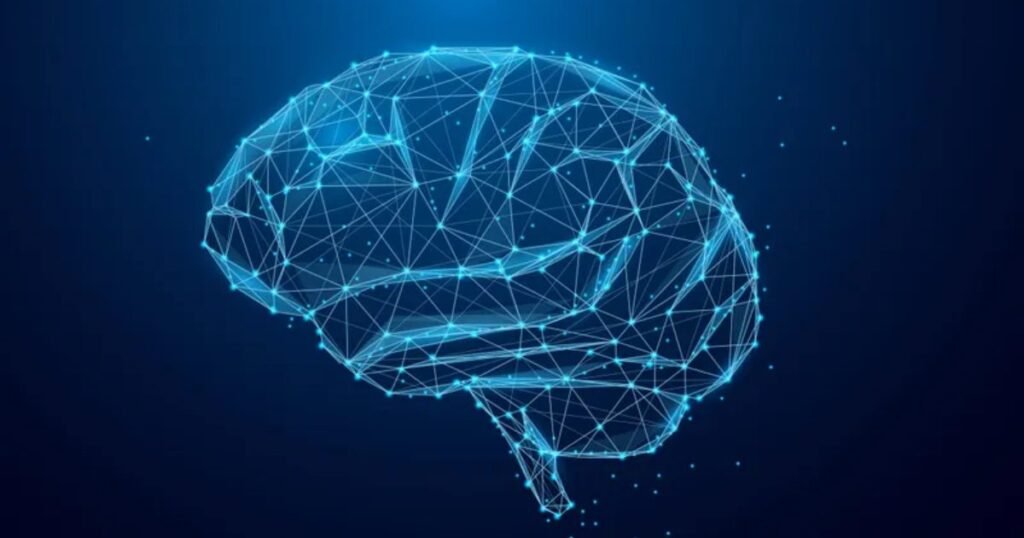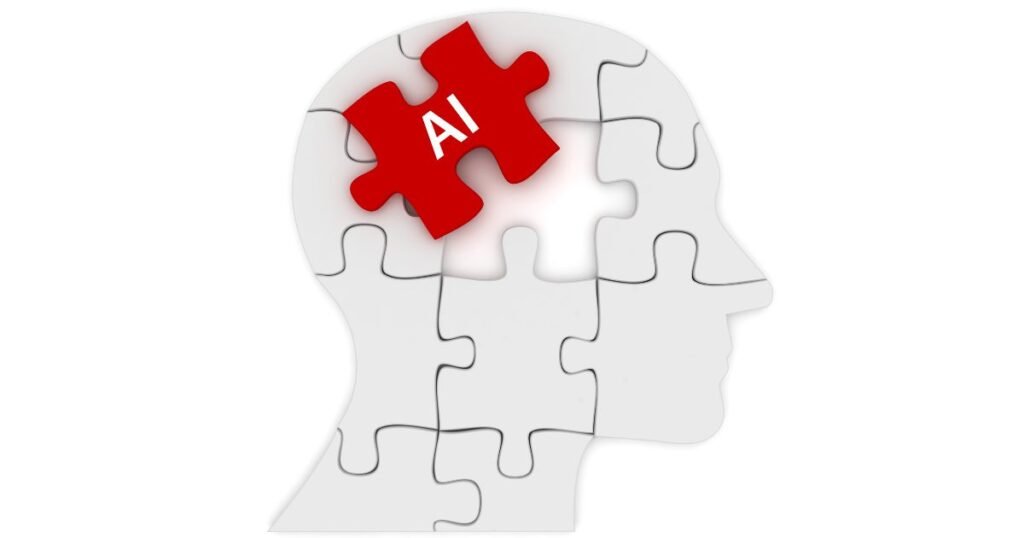
AI is rapidly transforming the world and has become a central force in society. New AI-enabled technologies are revolutionising and benefitting almost all aspects of the economy and society. Much research on AI and allied fields has been carried out to explore and develop impactful solutions for businesses and clients.
Artificial Intelligence research develops and explores technologies that mimic the behaviour and intelligence of humans. It involves various aspects, including design and development, models, and analysis of algorithms that enable machines to accomplish tasks that need human intelligence. AI research aims to develop intelligent and intellectual systems that can observe, reason, learn, and interact with the world like human intelligence. AI research spans an array of domains, including:
- Robotics and human-robot interaction
- Machine Learning
- Computer vision
- Computational Creativity
- Augmented Learning
- Cognitive Modelling
- Natural Language Processing
- Knowledge Representation etc.
Top 20 AI Research Topics
Perhaps we will see that intelligence is not restricted to humans alone in the future! Machines will also think like humans and work together to create an exhilarating universe. AI is making many advancements, and extensive research is being carried out in various fields, including Healthcare, Robotics, Quantum computing, Autonomous Vehicles, etc. If you are keen to research Artificial Intelligence, there are many topics to explore. Twenty of these topics, with a brief overview, are provided below.
20 Unexplored AI Research Topics for PhD
1. AI for Quantum Computing

AI has certain limitations beyond which it will not be able to perform well. It can only function to their set limit of computational power. However, with quantum computing advancements, AI and machine learning can perform at significantly higher levels. There are various applications of AI Quantum computing:
- It resolves complex problems in a shorter period
- It efficiently manages large datasets
- Detects and combats fraud
- Develop better models.
Due to its potential applications, AI in quantum computing is gaining traction.
AI for quantum computing is a unique doctoral program. Students enrolled in this program will conduct sustained and wide-ranging research on applications of Quantum Computing. The program explores the laws of quantum mechanics to process many calculations instantaneously.
2. AI for Social Robotics

Social robots are designed to engage with humans, making them valued companions in various settings (both emotional and social contexts). Artificial Intelligence enables these robots to respond to and understand human behaviour and emotions. Research in this interdisciplinary field includes HRI/robotics, culture, communication, AI, and creative informatics. Doctoral students can explore the social and ethical consequences while pushing the limitations of technological innovation.
3. AI for Personalised Learning

The onset of e-learning has profoundly transformed the educational landscape. Traditional learning gradually embraces innovative approaches, integrating AI systems to generate personalised learning pathways, deliver targeted instructions, address learning gaps, and more. Candidates interested in technology, cognitive science, and education can pursue a doctoral programme in this discipline.
4. AI for Explainable Music Generation

Explainable AI is a set of methods and processes that allow humans to understand the results generated by machine learning (MI) algorithms, neural networks, and deep learning. It is one of the key necessities for applying responsible AI, as it can improve user experience and help them trust AI decision-making processes. The lack of Explainable AI for music makes it a challenging Research option.
5. AI for Mental Health Assessment and Intervention

AI is quite promising in the field of mental healthcare. There are areas that need additional research, and the current techniques used in mental health need to improve so that they can be redefined more objectively and identify mental illnesses at a prodromal stage. Leveraging AI techniques for Mental health helps develop better pre-diagnosis and can potentially transform how we process mental healthcare.
6. AI for Disaster Response and Management

The growing instability of climate and rising incidents of natural calamities makes AI indispensable in disaster management. The application of AI will not only help forecast disasters but also help mitigate and respond to the situation in a better way. Candidates with proficiency in data science, a solid background in behavioural economics, econometrics, statistical analysis, and experience in machine learning algorithms meet the requirements to pursue PhD in this field.
7. AI for Environmental Conservation

AI is increasingly being applied to study environmental issues with promising results. AI can solve many environmental problems by analysing data to predict natural disasters, monitor environmental conditions and detect illegal activities such as poaching and deforestation. The untapped environmental data sets provide excellent research opportunities.
8. AI for Drug Discovery and development

Artificial intelligence can be used virtually to screen and augment compounds, predict protein-drug interactions, and estimate their bioactivities. It can also aid in planning efficient pathways for chemical synthesis, choosing potential patients for clinical trials, and predicting their outcomes. A PhD programme in AI-driven drug discovery aims to address the strategic needs of biomedicine and speed up the drug discovery process, saving the cost of drug development.
9. AI for Augmented Reality and Virtual Reality

AI and Augmented Reality are popular additions to sci-fi novels and have been the hottest research topics for the past several years. Augmented, virtual, and mixed reality are related topics within the broader spectrum of Extended Reality. AR and AI technology can accomplish several things that may not be possible to achieve alone. Although both are different techniques, certain overlapping areas provide many exploration opportunities.
10. AI for Sustainable Agriculture

Integrating AI in farming will be a path-breaker for sustainable agriculture. AI’s ability to process vast data will help make informed decisions on real-time crop monitoring, pest control, irrigation, etc. A doctoral degree in this subject will empower AI scientists to develop, invent, and deploy technologies co-created with agri-food practitioners and growers.
11. AI for Neurodiversity

Neurodiversity states that everybody thinks and processes information and data differently, particularly people with neurodivergent disorders. However, there is currently a lack of research in this area. Progress in AI-based interventions can help neurodivergent pupils reach their full potential.
12. AI for Cultural Heritage and Preservation

AI is gradually permeating our lives, even in fields that do not belong to a futurist universe, like cultural heritage, museums, and preservation. The results are pretty promising in domains like completing a musician’s incomplete composition, reconstructing art, identifying the writer of an ancient text, etc. AI also benefits historical and archaeological research, helping broaden our knowledge and localise sites. Candidates with a Digital Humanities or Computer Science degree can pursue this doctoral program.
13. AI for Behavioral Economics

Behavioral economics studies the effects of cognitive, cultural, social, emotional, and psychological factors on an individual’s and institution’s decisions and how these decisions differ from those suggested by classical economic theory. AI and behavioural economics may interact, especially in future economic developments and research frontiers.
14. AI for Urban Planning and Design

AI-powered tools enable communication between community and urban planners. Augmented or virtual reality applications can aid residents in imagining the proposed changes. They can provide their feedback, thereby promoting the widespread participation of individuals in urban planning and design. Candidates with degrees in urban design, computer science, or architecture and good knowledge of computing tools can pursue their PhD research journey in this discipline.
15. AI for Responsible Innovation

AI can tremendously improve innovation by generating and evaluating new ideas, improving decision-making, assessing risks, conducting analysis, and so much more. Responsible use of artificial intelligence is of particular importance. The PhD program in responsible AI tackles interdisciplinary research challenges, responsible use of information, and AI application. Research in responsible AI is a young discipline that needs to be bundled with studies from various disciplines to design AI systems that are transparent, secure, reliable, and legally acceptable.
16. AI in Criminal Justice Systems

Cyberattacks have increased significantly in recent years, creating chaos in the criminal justice system. AI, predictive analysis, machine learning, and soft evidence can be used to sort out current criminal records by using metadata, thereby predicting crime. Research and use of AI in criminal justice will not only reduce crime but also reduce justice-related delays.
17. AI for Responsible Data Stewardship

Data Stewardship links a company’s business and engineering sides to ensure governance, security, integrity, and data quality. AI can significantly relieve the workload of data stewards with AI-powered automated classification, metadata enrichment, and more. Data Stewards must work together with AI developers to ensure that AI systems are not only ethically responsible but also technically sound.
18. AI for Neuromorphic Computing

Neuromorphic computing is a technique wherein the elements of a computer (both software and hardware) are modelled after the biological structures of the human brain. It leverages inspiration from the field of biology with a combination of advances in ML (machine learning). This is an emerging field with an array of research opportunities. Candidates with a keen interest in interdisciplinary research and a master’s degree in computer science, electronics engineering, or AI can pursue research in this area.
19. AI for Precision Medicine

The combination of Precision Medicine and AI has the potential to revolutionise the healthcare system. There are unprecedented opportunities to pursue research in this field. Some topics that can be explored are AI-aided diagnosis, AI-enhanced treatment, quantitative imaging and radiomics, and AI for patient safety. Even though care must be taken while applying these technologies, there is much promise. AI in healthcare can be successfully implemented by adopting the main principles: analytics and insights, security and data, and shared expertise.
20. AI for Multimodal Emotion Recognition

Emotional expression is a crucial link between daily communication and human social activities. Emotional recognition is a technique that uses AI to recognise emotions at a multimodal level. This innovative research topic in academia is still in the infant phase, and exploring and perfecting AI emotion recognition is crucial. Specific challenges exist, but pushing the achievable boundaries will enable efficient, robust, and morally sound structures for emotion recognition technology.
FAQ: Top 20 Unexplored AI Research Topics for PhD
Which topic is best for research in AI?
Some research topics in artificial intelligence that are gaining traction include Ethical AI, AI for Healthcare, AI for Climate Change, explainable AI, Computer Vision, and Natural Language Understanding.
What is the use of AI in Research?
Some of the critical uses of AI in research include Predictive Modelling and Simulation, Data Analysis and Pattern Recognition, Image and Video Analysis, Natural Language Processing, robotics and Automation, Scientific Discovery and Innovation, Drug Discovery and Development, and Personalized Medicine and Healthcare. AI plays a transformative role in research by improving various aspects and addressing complex scientific challenges.
What is the hottest topic for AI research?
The hottest topic can vary depending on the specific interests, emerging technologies, and recent trends. A few of the areas receiving a lot of attention include AI for Healthcare, Explainable AI, Ethical AI, AI for Autonomous Vehicles, and AI for Climate Change.
